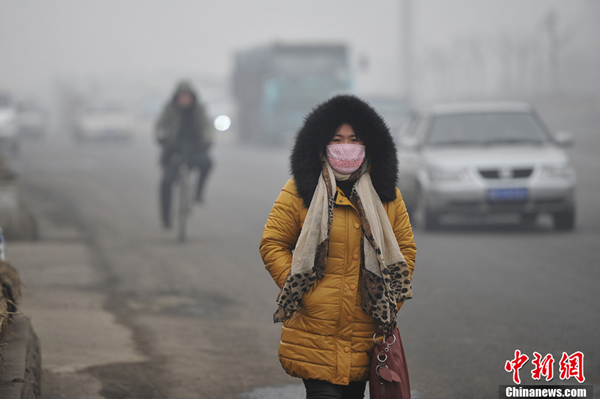China regulates to assess local governments on smog
Xinhua, May 28, 2014 Adjust font size:
The State Council, China's cabinet, on Tuesday issued a regulation on assessing local governments' performance in implementing a government action plan on air pollution control.
 |
|
A woman wearing a mask walks amid dense smog in Tangshan, Hebei Province, on Feb. 17, 2013. [Photo/CNS] |
The Chinese government is trying to link the career of local officials with their work on air pollution control in a bid to better incentivize them in this regard.
In the plan, launched in September, the government aims to cut the density of inhalable particulate matter by at least 10 percent in major cities nationwide by 2017.
PM 2.5, a key indicator of air pollution, should fall by about 25 percent from 2012 levels in Beijing and surrounding provincial areas by 2017, while the Yangtze Delta and the Pearl River Delta regions would see reductions of 20 and 15 percent respectively.
Provincial governments will be assessed annually in terms of implementing this plan by 2017. According to the document, the State Council set four categories: excellent, good, standard and substandard.
The provincial regions earning an excellent assessment will receive more funds from the central budget for air pollution control while those getting a substandard assessment will get less.
Also, if a provincial region fails the annual assessment, that is, gets a substandard assessment, chief officials of the provincial government and its environment regulatory agency will be questioned by the Ministry of Environmental Protection, the Party's organization and discipline departments.
If the provincial region fails the final assessment, the chief officials might be questioned by the premier.
The State Council will hand over the assessment results to the party's organization as a key reference on the performance of senior provincial officials.
Local governments will be graded substandard if they are caught altering or faking environment indices. Officials involved will be punished for discipline violation and even breaking the law.
Beijing and surrounding provincial areas, the Yangtze Delta, the Pearl River Delta and Chongqing Municipality, the major industrial zones facing heavy air pollution, will be assessed on the reduction of PM 2.5. The rest of the country will be assessed on the reduction of PM 10.
Environment protection departments are usually free to implement air pollution control measures independently but they actually need efforts from all departments, said Zhai Qing, vice minister of environmental protection.
Clarifying the roles of provincial governments and their leadership will greatly facilitate the implementation of the action plan, Zhai said.

